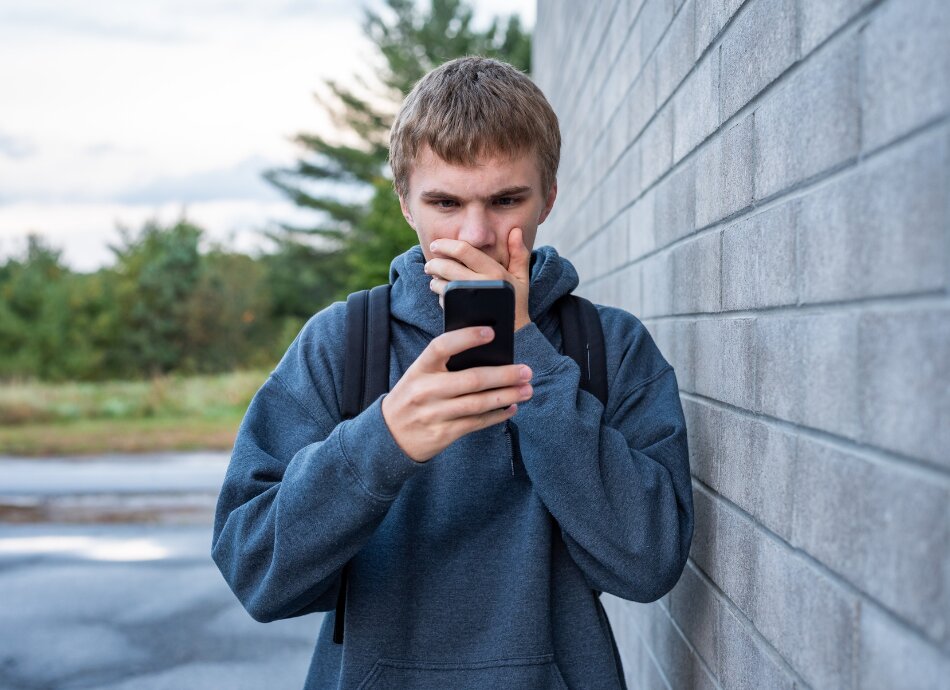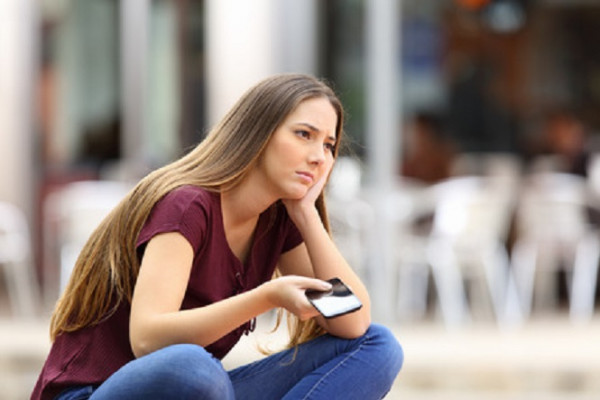If you're a frequent visitor to Healthify, why not share our site with a friend? Don't forget you can also browse Healthify without using your phone data.
Online bullying – how to deal with it for you or your kids
Key points about online bullying
- As technology becomes central to everyone’s lives, online bullying or ‘cyberbullying’ and other forms of digital harassment are on the rise.
- It can have a devastating impact on people’s lives and wellbeing, especially children and teens.
- In Aotearoa New Zealand, there is a law to help protect you from online bullying.

Online bullying or digital harassment can be when someone uses the internet, email, mobile phones, apps or social media to:
- send or publish threatening or offensive materials or messages
- spread damaging or degrading rumours about you
- publish online images or videos of you against your will
- create fake accounts using your name or image to harass people.
It might also be the volume of things being sent to you that leaves you feeling uneasy. For example, if you are being bombarded with a large number of text messages every day. You may receive unwanted attention via texts, emails, mobile phones, blog pages, websites, social media sites, online forums or apps.

Image credit: 123rf
Access to technology means that cyberbullying and harmful digital communication can happen at any time – even your own home may not be a safe haven from bullying. Students and young people can communicate with each other unsupervised and free from adult scrutiny. The nature of technology means that digital content can be seen and shared by a large audience very quickly, and is hard to track and delete.
Cyberbullying can involve people who have never met in real life. Being able to attack someone online and still remain anonymous creates an imbalance of power, as you don't know their age, physical strength, social status or where they live.
Firstly, remember that anybody threatening to physically hurt you or damage your property is breaking the law. If you feel like you are in immediate danger you must call 111 straight away.
In Aotearoa New Zealand, there is a law to help protect you from online bullying. It is called the 2015 Harmful Digital Communications Act. The act targets digital communication such as social media, texting and other online messaging to prevent cyber stalking, bullying and harassment. A number of people have already been charged under the act and have faced fines and/or jail. Find out more about the law to protect you.(external link)
You can also report harmful content(external link) to Netsafe, who provide a free and confidential service to help people experiencing online bullying, abuse and harassment.
Under the Harmful Digital Communications Act, schools/kura must provide a safe physical and emotional environment, which includes cyberbullying and online harassment. Anyone, including a school representative can file a complaint with Netsafe on behalf of a young person targeted in an online incident.
1. Control your own social media
Social networking sites like Facebook, Instagram, YouTube, TikTok etc allow you to report content, block and unfriend people. If you’re not sure how to, visit the safety centres of the social media platforms for help. You can also disable comments on your posts and videos on some platforms.
2. Check your security settings
It’s really important to make sure your security settings are as high as they can be. For example, on Facebook, who can actually see your posts and photos? You might be surprised. Check, and double check.
3. Block or report mobile phone bullying
You can block phone numbers that are sending bullying or abusive messages to your mobile. You can search online to learn how, or contact your phone service provider for assistance. Phone companies in Aotearoa New Zealand have special agreements in place to help stop harassment.
4. Be careful sharing contact details
To minimise the chance of unwanted attention online, be really careful who you give your contact details to. Do you really know the person? Is the person who they say they are?
5. Be careful who you reply to
Don’t reply to texts or messages from people you don’t know. Simply don’t engage with the person. Most often the sender will get bored and stop sending messages if they aren’t getting a reply.
6. Don't delete offending content
If it reaches a point where police intervention in needed, the offending content may be used as evidence. Keep a record of when you receive the offending content and any details about who it’s from. Find out more about what to do if you are sent offensive material.(external link)
Video: We asked people who have been cyberbullied how it made them feel. This was their response...
(Voices of Hope, NZ, 2021)
Video: "I woke up to my name trending fourth on twitter" – Kiel Tutins story – cyberbullying
(Voices of Hope, NZ, 2021)
Video: "It only takes one negative comment to completely ruin my day" – Amy's story – cyberbullying
(Voices of Hope, NZ, 2021)
Video: You wouldn't say it to their face
(Voices of Hope, NZ, 2021)
1. Start the conversation young
As soon as possible, start talking to your kids in an age-appropriate way about what online bullying is and why it’s not okay. Reinforce that there’s no difference between saying something mean in person and saying something mean online – both are harmful and not acceptable under any circumstances. Make sure they understand that something that is posted online can stay there forever. Also, teach them that if they are being bullied online, they need to tell an adult straight away. You should also talk to them about online grooming – when an adult tries to build a relationship with a young person online so they can sexually exploit them in some way.
2. Keep the communication lines open
Talk to your kids regularly about online bullying and safety and let them know they can come to you if they have any questions or need help. Try to stay calm and be non-judgemental when they tell you things. If you overreact, they might shut down and stop telling you things in the future.
3. Be tech-savvy
Learn about the social media platforms your kids are on and how they work. Talk to your kids about which ones they are on and why and what’s good or bad about them.
4. Keep devices in a common area
Depending on your kids’ ages, you can keep their devices in a common area such as the living room so you can monitor usage. It also gives you more of an opportunity to see what they are up to online.
5. Set clear limits and rules
Right from a young age, set clear rules about device usage. For example, no devices after 7pm or no devices in their bedrooms. This helps limit usage and potential exposure to bullies at all hours. If they are younger, a rule could be that must share their password so you can regularly check through their messages. Explain they should only give their contact details to people they know.
6. Be a good role model
Set a good example for your kids by being kind online. If they see you acting responsibly and kindly then they are more likely to copy your behaviour and do the same.
Where to get help
Netsafe(external link) provides free and confidential advice and help.
- Text “Netsafe” to 4282
- Email [email protected]
- Free call 0508 NETSAFE (0508 638 723)
- Online report at netsafe.org.nz/report(external link)
Harmful digital communication(external link) justice.govt.nz
What to do if you are being cyberbullied(external link) justice.govt.nz
Advice for parents about cyberbullying(external link) New Zealand Police
Safer Internet Day(external link) Netsafe
Online bullying – advice for parents(external link) Netsafe, NZ
The LGBTQ+ guide to online safety(external link) vpnMentor
LGBTQ+ online security – complete guide(external link) CyberGhost
Brochures
How to stop online bullying(external link) Netsafe, NZ, 2020
Report harmful content(external link) Netsafe, NZ
How to record digital evidence(external link) Netsafe, NZ
Find your nearest Police station(external link) New Zealand Police
What to do if you’re being cyberbullied(external link) Ministry of Justice, NZ, 2015
References
- Harmful digital communication(external link) justice.govt.nz
- How to record digital evidence(external link) Netsafe, NZ
- Online bullying – advice for parents(external link) Netsafe, NZ
Credits: Healthify editorial team. Healthify is brought to you by Health Navigator Charitable Trust.
Last reviewed:





